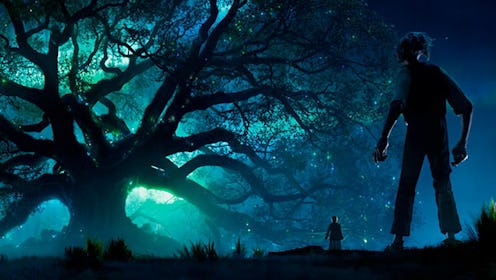Entertainment
'The BFG' Has Tragic Roots

I'm of the belief that Roald Dahl saved my young life. Though the author died the year before I popped into the world, his books like Matilda, The Witches, and James And The Giant Peach made a resounding impact on me. Revolving around characters who use their wild imaginations to make an escape or become more self-realized, Dahl's stories respect the experiences of children and spoke to my baby queer identity. They also translate to the screen with ease. Case and point: The BFG , a new film based on Dahl's 1982 book of the same name, already hit Cannes earlier in 2016, and will arrive in theaters on July 1.
If you haven't read the book, here's a quick rundown of what to expect from the new movie: Sophie, an orphan, befriends the "Big, Friendly Giant," who blows dreams into the windows of children's bedrooms as they sleep. Unlike other giants, the BFG doesn't eat children, and instead lives off of a nasty vegetable called a snozzcumber. He and Sophie become fast friends and the BFG takes his new pal to Giant Country, where she encounters both the magical and the malignant. Bloodthirsty giants begin to snoop around, and eventually, Sophie makes her way to the Queen of England with the BFG and calls for action against these kid-eating monsters. The basis for the story's sense of struggle and triumph seems to have come straight out of the author's life. If it sounds like a bit of a dark plot, consider that Dahl dedicated the book to his late daughter, Olivia, who died of measles at the age of seven.
We'll have to see if the film will maintain the slight gore of the original book, but there is an issue behind this story still relevant to contemporary audiences: vaccinations. While the measles don't make an appearance in this story, Dahl wrote about his experiences watching his child die of the illness and channeled this grief into a story where a member of a "bad community" teaches a little girl how to save the world, a plotline that mirrors how vaccines work. With these shots, your body gets a manageable amount of the infection and essentially learns how to ward off a certain illness.
Dahl himself penned a call to action and spoke out against his daughter's unnecessary death, noting that there was no vaccine when she contracted the measles, writing in a now-famous letter:
"On the other hand, there is today something parents can do to make sure that this sort of tragedy does not happen to a child of theirs. They can insist that their child is immunized against measles. I was unable to do that for Olivia in 1962 because in those days a reliable vaccine had not been discovered."
It sounds like mine probably wasn't the only young life saved by Dahl.
Photos: Giphy (2); Walt Disney Studios